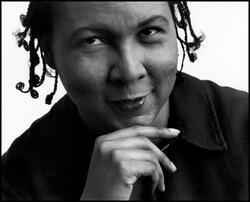Black Radio Time Travel: Black People, Love, and Preserving the Sounds of Salvation
“I want all my people around me, everybody feeling good, everybody eating good, everybody chilling. I want for my brother what I want for myself.”
– Kindred the Family Soul
Seamlessly at one with this groove, I close my eyes and nod my head, mouthing these feel-good lyrics, riding a wave of sounded Black flourishing. I am transported, floating on the harmonies in the air of our family reunion.
The spring breeze lightly caresses my skin, lacing my nose with the aroma of Mom’s macaroni and cheese that only makes an appearance for 10 seconds before news spreads that it is served. I smell the smoke from a charcoal grill stacked with that good vinegary Carolina BBQ. In the distance, I hear the click-clack of the jump rope and my cousin’s interlocking rhythmic footsteps as he finally gets his turn to jump double Dutch. And we laugh loudly, checking out folks’ coordination in their matching family reunion outfits. My grandaunt calls us to prayer and as we assemble, my “uncle-cousin” (what I call a cousin old enough to be my uncle) sings what the Spirit has laid on his heart to sing. We join in. We are reunited in this reverie from years ago and it feels so good to remember this pre-Covid soundscape of Black love brought to me by listening to the radio.
One day, over a good meal and some crafted beverages, we will tell you of our love story which we know is evidence of fervent and answered ancestral prayers. God has not forgotten.
Written and recorded by Kindred the Family Soul, a couple who are Black followers of Islam from Philadelphia, this music and its lyrics illustrate the sound of healing found in family reunion and block parties. To me, playing and listening to music that explores Black people and love is a true religion that saves us, carrying our shared faith into the everyday presence of the divine. This kind of music releases us to strive toward our beloved community in the midst of myriad domestic terrors. Through the enduring time machine that we affectionately call Black radio, we tell our stories and capture our communal memories. Black radio is also an emblem of the ways in which we preserve our private lives.
Off-the-Grid Connection
The incessant 2020 coronavirus global pandemic seemingly pushed the entire world into a digital age, forcing many people to shed their analog technology. At the same time, however, it actually widened the digital gap of multi-media consumption in locales where internet and mobile reception are intermittent.
We have observed this firsthand through our North Carolina radio stations called Paradise Radio in Oxford (WCBQ) and in Henderson (WHNC). This global crisis has taught us the ways in which music enthusiasts need access to consistent, free, intergenerational, non-syndicated, and low-tech media in the comfort of their cars and off-the-grid homes. Local Black churches rely on the radio station to provide multi-genre playlists, worship services, and Bible study in order to remain connected to their congregants. Paradise’s patrons request culturally relevant media training to serve widely dispersed rural communities. Although “urban radio” in city centers has been diagnosed as an ailing medium giving way to online streaming services, rural radio remains a lifeline.
Paradise Radio is our Black women-owned broadcasting service and a central gathering space for socializing, concerts and festivals on its rolling acreage in Grafton County, NC. My sister Angela Marie Jones and I inherited the station when my father passed away, after my parents Rev. Dr. Alvin Augustus Jones and Rev. Dr. Martha Butler Jones sacrificed and fought for years to maintain ownership of it to amplify our community’s rich stories and culture. Our father was taught that a real man leaves an inheritance for his children no matter what it costs him as a Black business owner in the South who fought to keep his dream alive. Our story of striving is not new news; however, my sister and I are determined to learn the lesson.
Health, Joy, Education
To this day, the elders tell us that integration was not good for people of African ancestry in the US. Desegregation destroyed a constellation of burgeoning Black relationships, economies, and businesses that had decentered capitalism and prized sharing, bartering, and hospitality. A result of the segregated race radio industries, Black-owned radio was, for instance, an early “open access” way that we educated, organized, and uplifted our communities, despite the unloving stereotypes that the dominant cultural entertainment industrial complex created about us.
Our committed, intergenerational listenership’s interest has been revived in part because of their need to remain informed in rural areas during “shelter-in-place.” We have learned from them that they do not know what they would do without the radio. They need reliable media with local information that they can get with or without electricity. Most of all, the listeners need their music to deal with isolation. All of this confirms that we must maintain mixed media that is produced for us and by us, for our health and joy, and not for the consumption of others.
The Matrimonial Moment
While we watch this reclamation of Black radio as a symbol of preserving our private lives, I am witnessing a simultaneous retrieval of our private lives in other salvific ways—such as getting married in spite of barriers like pandemics and the politics prompting social unrest. My spouse Rev. Calvin Taylor Skinner and I are one of several Black couples in our YDS alumni network who chose to take marital vows discreetly in our homes and yards in the midst of so much loss in our African-American community—one of the hardest hit demographics in our country due to the pandemic. We rejoice with those who chose love by gathering friends and family through streaming and video conference platform.

To love and make music despite the loom of death in the air is both a transgression and salvation. In Salvation: Black People and Love (2001), bell hooks teaches us that “salvation” among Black people is based on the liberty to love deeply and ethically—free of and in spite of interference from the dominant, anti-Black culture. For decades, a misconception has persisted that people of African ancestry are disinterested in protecting family connections. To this stereotype I retort that clearly those naysayers do not know how to see, hear, or value our pursuit of Black love, and that it was not always achieved without great cost and difficulty.
Jumping the Broom
But if we tell the story of our lives, we must tell it fully. We must talk about those entities that have despised our salvation. Colonialism and Jim Crow segregation actively destroyed healthy Black communities and solid family units, attacking all signs and sounds of Black love. In the chattel slavery system, enslaved African people were only to produce more enslaved people to bolster the plantation economy. Enslaved people were not permitted to marry legally, and so they found other ways, like the ritual of “jumping the broom” to acknowledge their matrimonial love when couples were permitted to be together. Various legal obstacles have been erected to ensure that Black Americans remain in the bottom working class without the transferal of wealth that comes from inherited family resources. We have been finding our way back to each other for years. And now, we are discovering ways for all of our people to gather around us through radio and virtual platforms.
One day, over a good meal and some crafted beverages, we will tell you of our love story which we know is evidence of answered, fervent, and effectual ancestral prayers. God has not forgotten. The truth is our love has grown so wide, tripling our family immediately to include loved ones spanning several states and countries.
For sure, I see my loved ones so much differently and brilliantly now because Love has found us in our most secret places.
This goes out to One whose perfect design brought Calvin Taylor Skinner’s journey to me as a gift, as my new home. May our communities continue to choose, protect, and preserve Black love regardless. … And may we be surrounded by other individuals and communities who join us in protecting Black love even when they gain nothing by standing with us.
Alisha Lola Jones ’07 M.Div., president of the YDS Alumni Board, will join the University of Cambridge music faculty next year as University Lecturer in Music in Contemporary Societies. She is currently Assistant Professor of Folklore and Ethnomusicology at Indiana University and the author of Flaming?: The Peculiar Theopolitics of Fire and Desire in Black Male Gospel Music Performance (Oxford University Press, 2020).

